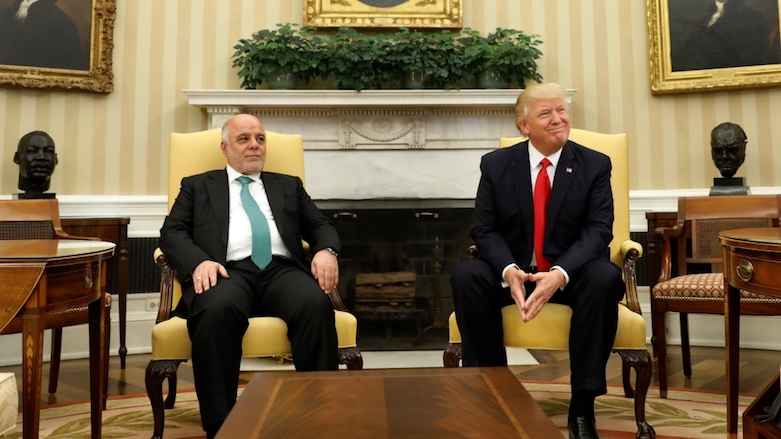US favors Baghdad over Erbil

WASHINGTON DC (Kurdistan 24) – The Trump administration still appears attached to the policy it inherited from the Obama administration, which is premised on maintaining Iraq’s unity and which favors Baghdad over Erbil.
In addition, Washington still seems to believe it can secure a second term for Iraqi Prime Minister Haider al-Abadi, which reinforces its preference for Baghdad, even when Iraqi measures against Erbil are dubious.
The road between Erbil and Kirkuk, closed since Iraq’s attack on the Kurdish-controlled city last October, is set to reopen. However, Baghdad has reportedly placed an unusual condition on the road’s reopening: the establishment of a customs post, from which it will collect all the revenues, on the border between the Kurdistan Region and the rest of Iraq.
Iraq is supposed to be one country, however, and maintaining Iraq’s unity is a central tenet of US policy.
So Kurdistan 24 recently asked State Department Spokesperson Heather Nauert, if a customs post on the Erbil-Kirkuk road is “consistent with your view of a unified Iraq?”
“This is largely an internal matter,” she replied, “between Iraq and Erbil, to try to work out.”
“Other countries,” she continued, “have done this in the past, including our own country.”
Yeah? Asked for further details, a State Department official cited regulatory barriers between US states: Arizona checked for fruit, Wisconsin for fireworks.
But, of course, a regulatory barrier is different than a customs barrier. The State Department also said that Italy had internal customs posts, but provided no further details.
So Kurdistan 24 turned to an expert: the University of Pennsylvania’s Lauder Professor of Political Science, Dr. Brendan O’Leary, who has done extensive work on these issues. He is the author or co-author of 22 books and of over 120 articles.
As O’Leary’s university webpage explains, he “has been a political and constitutional advisor to the United Nations, the European Union, the Kurdistan Regional Government of Iraq, the Governments of the UK and Ireland, and to the British Labour Party during the Irish peace process.
O’Leary explained to Kurdistan 24 that there could legitimately be a regulatory barrier between the Kurdistan Region and the rest of Iraq.
However, “a customs barrier between two provinces inside the same common market” would be “bizarre,” he said.
It was such a strange idea that O’Leary suggested the reporting might be misleading. If it really is a “customs barrier between Kirkuk and the Kurdistan Region, that would be astonishing,” he remarked.
“It would be like going back to German principalities, before they created the common market in the 1840s,” O’Leary continued. “It is very rare for there to be customs barriers between one province and another.”
Asked directly, “Is Baghdad allowed to impose a customs barrier between Iraq and the Kurdistan Region?,” O’Leary answered tersely: “No.”
Paul Davis, a former Pentagon analyst and presently a Senior Fellow at Soran University, suggested to Kurdistan 24 that the US position was, almost certainly, a continuation of its effort to keep Abadi as prime minister for another term.
So the US regularly rubber-stamps, whatever his government does.
“They don’t know how to do anything else,” Davis said, noting that in his experience, bureaucracy is, truly, the realm of the routine.
“People keep doing what the guy before them did,” he said. “That is, almost always, the safest thing.”
Until recently, US policy on Iraq has prompted little criticism from the Washington establishment, but two recent critiques might signal a change.
The Washington Institute for Near East Policy hosted a somewhat surprising seminar on Iraq on July 25, with all the panelists criticizing US policy, and none defending it.
Washington became tired of Iraq some time ago—“Iraq fatigue,” the panelists dubbed it, although the war in Iraq was America’s most serious—and costly—war since Vietnam.
Both Nussaibah Younis, of Chatham House, and Geneive Abdo, of the Arabia Foundation, criticized the US focus on ensuring Abadi’s continued tenure.
“The US embassy has made it very clear that [Abadi] is their choice [for prime minister] and that he should have another term,” Abdo said.
Younis described “this obsession” with Abadi remaining prime minister as “a reflection of the laziness in policy-making here.” She emphasized the need to engage with Iraqis “across the political spectrum,” adding, “Abadi is unlikely to maintain his position.”
Noting the Trump administration’s lack of interest in Iraq, in sharp contrast to its focus on Iran, she asked, “Why isn’t your Iraq policy a component of your Iran policy?”
Two weeks later, on August 6, The Washington Post published an article, datelined Baghdad and titled, “Street Protests in Iraq could cost pro-American prime minster his job.”
Abadi has, indeed, tried hard to accommodate the US. Notably, he recently affirmed that Iraq would abide by the US sanctions on Iran.
On Sunday, the Arab News suggested that stance may cost him his job. The Saudi-based paper quoted an Iraqi political analyst, Abdulwahid Tuama.
“Everyone knows that Abadi needs the support of both Iran and US to win a second term. One of them is not enough,” Tuama said, “and all signs indicate that he lost any chance to get Iranian support.”
So if Abadi doesn’t return as prime minister, what was the point of consistently subordinating Erbil to Baghdad, no matter how dubious the Iraqi measures?
Paul Davis, citing the growing tensions between Turkey and the US, suggested that Washington may come to truly regret that it did not treat better its only true friend in that part of the Middle East—the Kurds.
